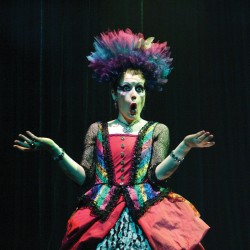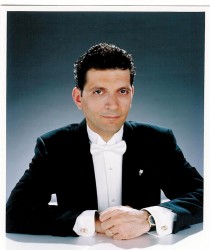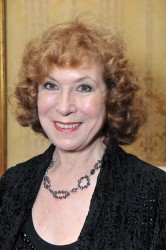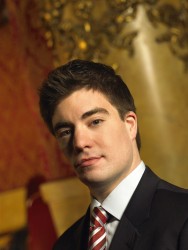Herring in the Grass?
This summer there is not quite as much opera on offer in town in July and August as there has been in past seasons. Yet, it is not totally absent and nearby summer music festivals should hold much of interest for opera lovers.
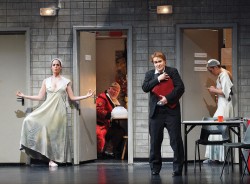 For staged operas with piano accompaniment, Summer Opera Lyric Theatre is always reliable. This year SOLT (www.solt.ca) is presenting Mozart’s Idomeneo on July 29 and 31 and on August 3 and 6 with Michael Rose as music director. Playing with it in repertory is Verdi’s La Traviata on July 30 and August 2, 4 and 6 with Jennifer Tung as music director and Aaron Copland’s seldom-staged The Tender Land on July 30 and August 3, 5 and 7 with Nicole Bellamy as music director. The Tender Land, which premiered at the New York City Opera in 1954, concerns Laurie, a girl about to graduate from high school, who falls in love with an itinerant worker. It was staged at Glimmerglass just last year. All performances take place at the intimate Robert Gill Theatre on the University of Toronto campus.
For staged operas with piano accompaniment, Summer Opera Lyric Theatre is always reliable. This year SOLT (www.solt.ca) is presenting Mozart’s Idomeneo on July 29 and 31 and on August 3 and 6 with Michael Rose as music director. Playing with it in repertory is Verdi’s La Traviata on July 30 and August 2, 4 and 6 with Jennifer Tung as music director and Aaron Copland’s seldom-staged The Tender Land on July 30 and August 3, 5 and 7 with Nicole Bellamy as music director. The Tender Land, which premiered at the New York City Opera in 1954, concerns Laurie, a girl about to graduate from high school, who falls in love with an itinerant worker. It was staged at Glimmerglass just last year. All performances take place at the intimate Robert Gill Theatre on the University of Toronto campus.
On July 9, Opera by Request (www.operabyrequest.ca) will present a concert performance of Verdi’s Il Trovatore with Steven Sherwood (Manrico), Carrie Gray (Leonora), Karen Bojti (Azucena) and Yevgeny Yablonovsky (Count di Luna) with William Shookhoff as music director. The performance takes place at the College Street United Church, 452 College St.
The 24th annual Brott Music Festival in Hamilton (www.brottmusic.com) offers several enjoyable options. Opera Ovations! on July 7 presents well-known opera excerpts sung by Ermano Mauro, Sinead Sugrue, Lauren Segal and Peter McGillivray accompanied by the National Academy Orchestra under Boris Brott himself. On August 6 the festival presents Bizet’s Carmen in concert with Lauren Segal (Carmen), Keith Klassen (Don José), Gregory Dahl (Escamillo) and Sinead Sugrue (Michaëla). Brott again conducts the NAO and Giandomenico Vaccari oversees the production. The previous day, Signore Vaccari will hold a dress rehearsal chat about the opera and discuss his role in rebuilding Bari’s famous Petruzzelli Theatre. The festival concludes on August 18 with a performance of Carl Orff’s Carmina Burana with John McMaster, Leslie Anne Bradley and Theodore Baerg.
To the west, Stratford Summer Music is presenting A Serenade for Maureen Forrester at the Avon Theatre on July 25 commemorating her life and career. Soloists include Kimberly Barber, Allyson McHardy, Catherine Robbin, Krisztina Szabó, Jean Stilwell and Mary Lou Fallis. In addition to musical performances will be tributes from music critic William Littler, director Brian MacDonald, prima ballerina Karen Kain and composer R. Murray Schafer. Video tributes will come from conductors Zubin Mehta and Sir Andrew Davis. For more information and to book tickets visit www.stratfordsummermusic.ca.
To the northeast the Westben Arts Festival in Campbellford is mounting a fully-staged production of Benjamin Britten’s Albert Herring from July 1 to July 3. The UBC Opera Ensemble is directed by Nancy Hermiston and Philip Headlam conducts the Westben Festival Orchestra. On July 14 well-known singers like Donna Bennett, Gabrielle Prata, Colin Ainsworth and Robert Longo take a break from opera to explore musicals from West Side Story to A Little Night Music and beyond. On July 24, Isabel Bayrakdarian with Serouj Kradjian at the piano presents a concert titled Sunday Afternoon at the Opera. Visit www.westben.ca for more information.
If you’re looking for rarities and would rather stay in Canada, head over to Quebec to the Festival de Lanaudière (www.lanaudiere.org) near Montreal. On July 30 it will present what must be the first fully-staged performance in Canada of the romantic opera Der Vampyr (1828) by Heinrich Marschner (1795-1861), a composer whose operas are known to have heavily influenced Wagner. Wagner, in fact, conducted the work in 1833 with his brother in the tenor role. The opera is ultimately based on the first vampire story in English, the short novel The Vampyre (1819) by John Polidori, doctor to Lord Byron and friend to Percy and Mary Shelley. The singers include Phillip Addis in the title role, Frédéric Antoun, Nathalie Paulin and Robert Pomakov. Alain Gaulthier directs and Jean-Marie Zeitouni conducts the Orchestre du Festival. Toronto last had a chance to hear the work in 1994 when Opera In Concert presented it. Since then others have championed it including Roberto Abbado, who conducted it in Bologna in 2008.
Opera productions in the US within a day’s drive of Toronto include Luigi Cherubini’s Medea (1797) in Italian at Glimmerglass Opera (www.glimmerglass.org) July 8 to August 16; Richard Strauss’s Die Liebe der Danae (1940) at the Bard Music Festival (http://fishercenter.bard.edu/bmf) July 29 to August 7; and at the Ohio Light Opera (www.ohiolightopera.org) July 15 to August 6, Cole Porter’s Jubilee (1935), Victor Herbert’s The Fortune Teller (1898) and Leo Fall’s Madame Pompadour (1922).
Christopher Hoile is a Toronto-based writer on opera and theatre. He can be contacted at opera@thewholenote.com.


